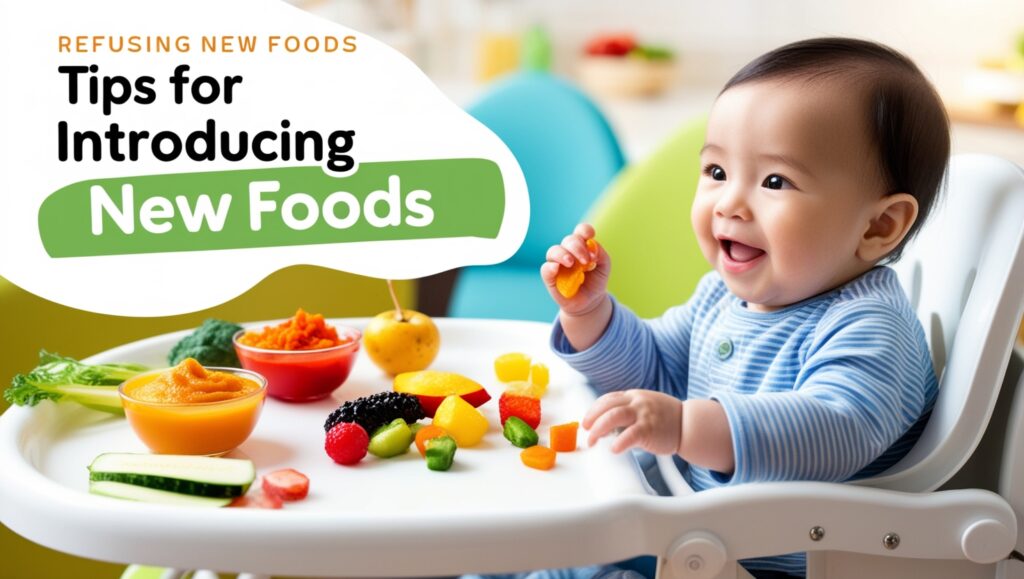As parents, one of the most critical decisions you make is what to feed your baby. Balanced nutrition isn’t just about filling your little one’s tummy—it’s about nurturing their body, mind, and development. Let’s explore how to provide well-rounded meals that lay the foundation for a lifetime of healthy eating habits.
What Makes a Baby’s Meal Balanced?
A balanced baby meal includes essential nutrients from all food groups:
- Proteins: Key for growth and muscle repair. Examples: lentils, chicken, eggs.
- Carbohydrates: Provide energy for active little ones. Examples: oatmeal, potatoes, bananas.
- Fats: Aid brain development and nutrient absorption. Examples: avocado, breast milk, olive oil.
- Vitamins and Minerals: Build immunity and strengthen bones. Examples: spinach, oranges, dairy.
By combining these, you can ensure your baby gets the nutrition they need for each stage of their growth.
Age-Specific Guidelines for Balanced Nutrition
4-6 Months: First Foods
- Begin with single-ingredient purees like sweet potato, carrots, or pear. These are gentle on tiny tummies and help identify allergies.
6-8 Months: Exploring New Flavors
- Mix purees to introduce combinations such as apple and zucchini or banana and avocado. Include iron-rich options like lentils or fortified cereals.
8-12 Months: Finger Foods
- Offer soft, bite-sized foods like steamed broccoli florets, scrambled eggs, or mini pancakes. Include diverse textures to promote chewing skills.
1-3 Years: Toddler Meals
- Introduce more complex dishes like veggie-loaded pasta or mini quinoa bowls. Encourage self-feeding to build independence.
Balanced Recipe Idea: Avocado and Banana Mash
Ingredients:
- ½ ripe avocado
- ½ ripe banana
Instructions:
- Mash the avocado and banana together until smooth.
- Serve immediately as a nutrient-packed snack or meal.
Nutritional Benefits:
- Avocado provides healthy fats for brain development.
- Banana offers natural sugars for energy and potassium for muscle health.
Tips for Creating Balanced Baby Meals
- Think Colorful: A variety of colors on the plate ensures a mix of nutrients.
- Avoid Over-Seasoning: Babies have sensitive taste buds—let the natural flavors shine.
- Portion Control: Babies have small stomachs. Start with small servings and offer more if needed.
- Hydration is Key: Breast milk, formula, or water should complement solid meals.
Snack Ideas for Balanced Nutrition
- 4-6 Months: Single-ingredient fruit or vegetable purees.
- 6-8 Months: Small yogurt bowls with mashed fruit.
- 8-12 Months: Whole-grain crackers with hummus.
- 1-3 Years: Cheese cubes and cucumber slices.
Common Mistakes to Avoid
- Skipping Nutrient Groups: Ensure each meal includes protein, carbs, and fats.
- Offering Too Many Sweets: Limit added sugar and focus on natural sweetness from fruits.
- Overcooking Vegetables: Light steaming preserves nutrients.
Why Balanced Nutrition Matters for Babies
- Brain Development: The first years are critical for cognitive growth. Nutrients like omega-3 fatty acids and iron play a vital role.
- Strong Immune System: Balanced meals packed with vitamins and minerals help prevent illnesses.
- Healthy Eating Habits: Introducing a variety of foods early reduces picky eating later.
Make Balanced Nutrition Easy with BabyFeasts
At BabyFeasts, we understand that planning balanced meals can feel overwhelming. That’s why we provide baby recipes and resources to simplify your journey. From first purees to toddler meals, we’re here to help you every step of the way.
Visit BabyFeasts.com for ideas, tips, and recipes designed to keep your little one happy and healthy!
Balanced nutrition today, brighter tomorrows ahead.

